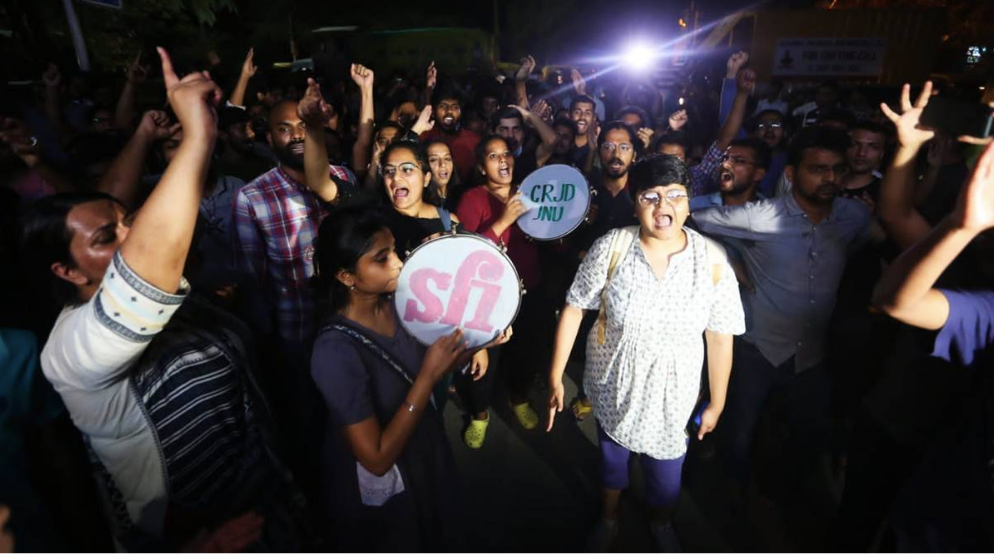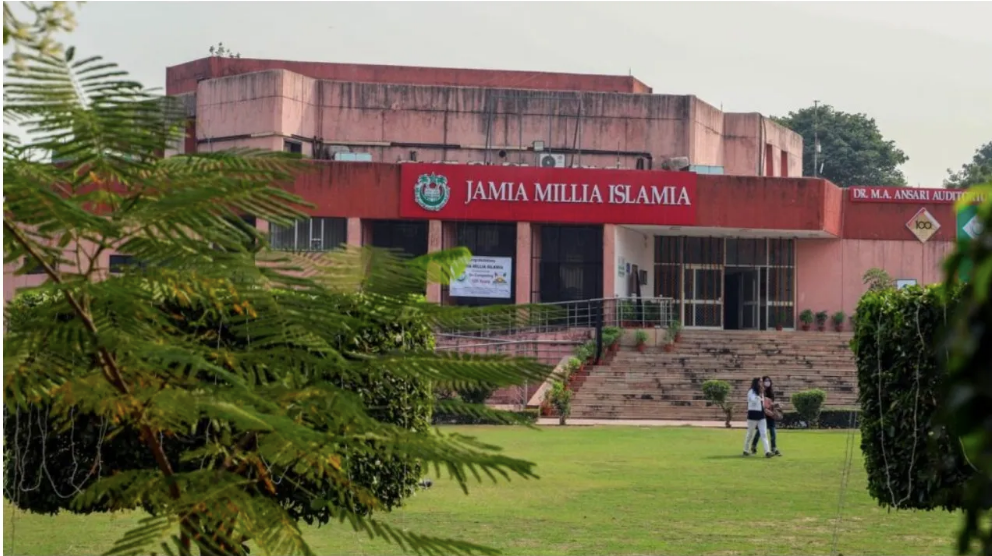Students in Northern India Protest Against Anti-Muslim Attacks
Students protesting in New Delhi, India at Jawaharlal Nehru University (JNU). Photo: Gajendra Yadav/India Express
On Tuesday, a group of students outside Jamia Millia Islamia (JMI), a university in New Delhi, protested against the recent violence that broke out on the Jawaharlal Nehru University’s (JNU) campus.
The violence at JNU, another university in the capital, started over a disagreement when the university chose to serve non-vegetarian food on Ram Navami, a Hindu festival, angering the right-wing Hindu student groups on campus and, in turn, upsetting Muslim students who are currently observing the holy month of Ramadan.
At least 20 students were injured after clashes broke out between the two student groups at JNU on Sunday. The violence was led by the Bharatiya Janata Party (BJP) affiliated group Akhil Bharatiya Vidyarthi Parishad (ABVP), which is a right-leaning Hindu extremist student group.
Musaddiq Mubeen, President of JMI’s Students Islamic Organization unit said, “the attack on students in Jawaharlal Nehru University (JNU) by Akhil Bharatiya Vidyarthi Parishad (ABVP) goons is extremely appalling and highlights the daylight thuggery and mobocracy that is becoming the norm across the country.” Mubeen went on to say that the attacks were made possible through the university’s lack of intervention and prevention.
JNU Vice-Chancellor Santishree Dhulipudi Pandit also spoke out against the violence at JNU and said that the university will not impose food choices on its students and will have zero tolerance for violence on campus related to any issue. However, this is not the first time that JNU has been at the forefront of clashes between Hindu and Muslim student groups. At the end of 2019, JNU was attacked by a group of masked men who attacked over 40 JNU students and teachers who were protesting against the discriminatory Citizenship Amendment Act (CAA).
Jamia Millia Islamia University in New Dehli where the recent protest occurred. Photo: Zee
The students at JMI were not only protesting against the violence that broke out on JNU’s campus but also against the ongoing series of Islamophobic attacks across the nation that took place earlier this week during the Ram Navami parades– and the state and central governments' inaction towards the same.
Last week, India witnessed a wave of anti-Muslim violence during the Ram Navami processions that were held specifically in Muslim communities, resulting in the vandalization and destruction of mosques, dargahs, and predominantly Muslim households. Most of the violence was reported in the states of Madhya Pradesh, Gujarat, Jharkhand, and West Bengal, most of which are affiliated with the BJP.
In Madhya Pradesh specifically, more than 35 people were injured and 10 houses were set on fire. Numerous shops in the Khargone district, the majority of which were Muslim-owned, were bulldozed and destroyed– echoing previous incidents of violence in BJP-led Uttar Pradesh that also targeted the Muslim minority. As a result, the police have now banned gatherings of more than four people and enacted curfews in affected areas in Gujarat and two other states.
Earlier in April, a South Delhi Municipal Corporation called for a ban on meat shops in New Delhi during the nine-day Hindu festival Navratri. The decision was made to respect those observing the fasting period that forbids garlic, onion, and meat consumption. The ban, which is currently being upheld by mayors from the BJP party, affects more than 1,500 meat shops. The order came with a great deal of backlash not only from meat vendors and the Muslim community but also from the 80% meat-eating Hindu population in India.
Kaushik Deka, the Deputy Editor of India Today magazine said in a tweet, “I'm a Hindu & eat non-veg almost daily. Didn't know what Navratri is before I came to Delhi. Ban on meat shops during Navratri is ridiculous in a democracy.”
The recent events have brought to light, once again, the upward trajectory in hate crimes and violence towards Muslims in India under the BJP rule. The violence that occurred on the college campuses over the weekend has attracted a global audience’s attention and forced other nations to speak out against Prime Minister Narendra Modi’s inaction.
United States Secretary of State Antony Blinken, in a statement on Monday, said that the U.S. was highly monitoring the recent events in India and the rise of human rights violations across the country. “We regularly engage with our Indian partners on these shared values, and to that end, we’re monitoring some recent concerning developments in India.”


